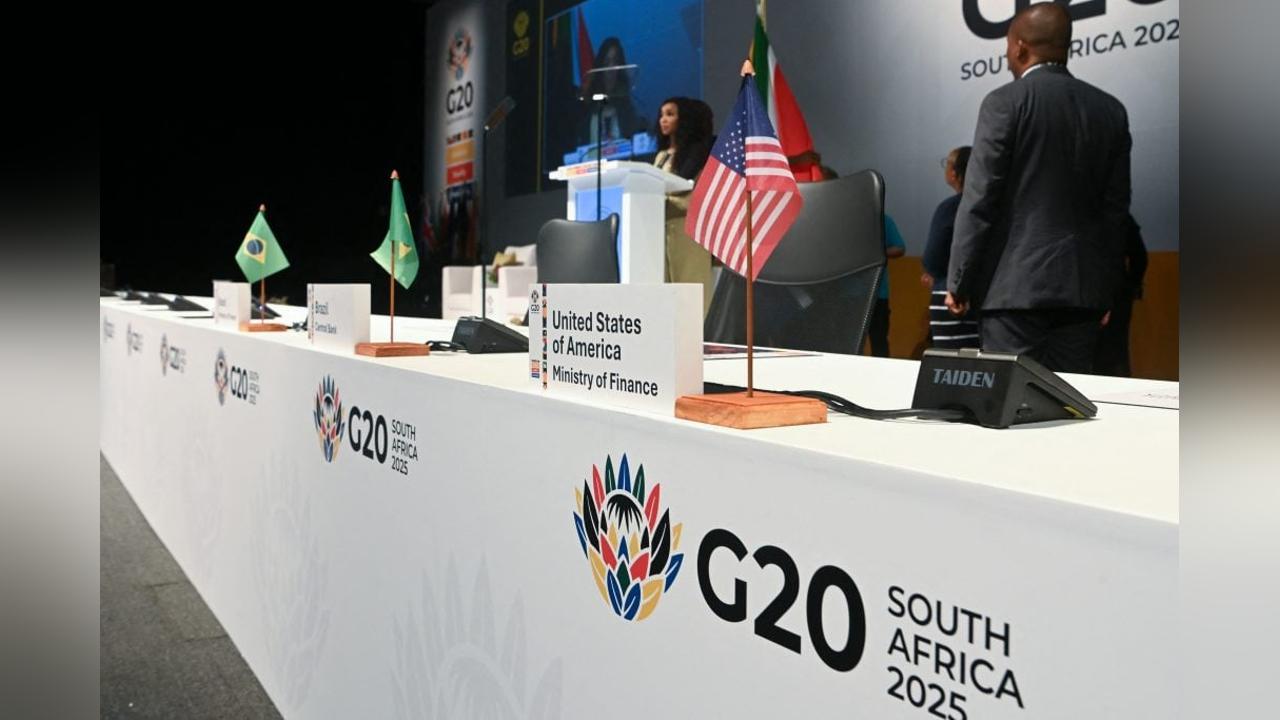Africa-Press – Uganda. Erastus Mwencha, former Deputy Chairperson of the African Union Commission and Joseph Atta-Mensah, former Principal Policy Adviser, UN Economic Commission for Africa, argue that the cost of servicing Africa’s debt is holding back investment in key sectors such as education and health across the continent.
When leaders of the world’s largest economies gather in Johannesburg on 22 and 23 November 2025, they will meet on African soil for the first time. The theme of South Africa’s presidency, “Solidarity, Equality, Sustainability”, captures the symbolism of the moment. Yet symbolism alone cannot change reality. Africa’s development is being quietly undermined, not by a lack of ambition, but by a global financial system that rewards repayment discipline while punishing investment in people.
Recent analysis by the Institute for Economic Justice shows that Africa, by repaying its debts, is defaulting on its development. Governments across the continent are keeping up with repayment schedules while falling behind on funding for essential services and climate action. The continent is not fiscally insolvent; it is structurally constrained.
A continent paying for the past
Africa’s external debt rose from £164 billion in 2008 to £588 billion in 2023. The problem lies less in the volume than in its composition. Concessional loans have declined sharply. Commercial borrowing, dominated by Eurobonds (a loan issued in a foreign currency) and syndicated loans (multiple lenders contributing to one loan), now account for about a quarter of Africa’s total debt.
African borrowers pay a risk premium of 1-2.6 per cent more than peers with similar fundamentals. This inflates borrowing costs and erodes fiscal space. With limited access to cheap credit, many countries have turned to Eurobonds. Issuance has surged by more than 1,170 per cent since 2000, exposing them to volatile global markets and shifting investor sentiment.
African governments now spend on average 16.7 per cent of their revenue on interest payments, the highest ratio among developing regions. They use nearly 15 per cent of export earnings to service debt, compared with less than 5 per cent in 2011. In Egypt, Ghana, Malawi and Nigeria, interest outlays already exceed expenditure on education or health.
Compounding the problem is the reality that not all debt has served productive ends. Some loans have been odious, contracted under opaque terms or used to finance politically driven projects that yielded little social or economic return. The cost of such unproductive borrowing is borne not by those who negotiated the loans but by citizens whose futures have been mortgaged.
The failure of the global financial architecture
The G20’s two main debt initiatives, the Debt Service Suspension Initiative (DSSI) and the Common Framework, were designed to ease the fiscal burden on low-income countries. In practice, they have provided access to short term cash, without improving long term financial health. The DSSI, launched in 2020, postponed only £10 billion of 48 countries’ debt service payments—less than what African countries collectively spend on interest every few weeks—and left private creditors outside the arrangement.
The Common Framework, which was intended to extend relief beyond the pandemic period, has so far processed only four African cases—Zambia, Ethiopia, Chad and Ghana. Zambia waited more than three years for a final agreement. The delays have eroded investor confidence and stifled growth.
The cost of inaction
The human cost of this global financial architecture is stark. Thirty of forty-nine African countries now spend more on interest payments than on public health. Education budgets have declined from an average of 3.9 per cent of gross domestic product in 2008 to 2.9 per cent in 2023. Between 2024 and 2030, the continent’s cumulative debt servicing payments will amount to £129 billion, roughly 137 per cent of its estimated climate-finance needs. The Africa Sustainable Development Report shows that Africa is making progress in 12 of the 17 Sustainable Development Goals (SDGs), however, the current pace of progress is insufficient to achieve the SDGs by 2030.
The injustice deepens when viewed through a climate lens. Africa emits less than four per cent of global greenhouse gases but loses between two and five per cent of its gross domestic product annually to climate-related shocks. When interest payments exceed climate adaptation budgets, inequity deepens. Debt relief that is explicitly tied to verifiable green investment, such as renewable-energy corridors, reforestation programmes and resilient infrastructure, would align fiscal policy with environmental survival. Debt justice and climate justice are inseparable; neither can advance without the other.
What the G20 must understand
Africa’s debt crisis is not about missed payments but about a system that protects creditors while constraining development. Previous initiatives provided liquidity without tackling the deeper inequities of global finance. What is needed now is coherence, not charity.
A two-year standstill on external debt payments would create fiscal breathing space to protect essential services. A global debt registry under the United Nations Conference on Trade and Development would ensure transparency and accountability.
Debt sustainability must be redefined to reflect a country’s capacity to invest in people and climate resilience. No framework is credible if it compels governments to defund citizens to repay creditors.
Debt relief should also be tied to measurable outcomes. If these measures are implemented, Africa’s debt-service burden could fall from around 20 per cent to 10 per cent of government revenue, releasing over £50 billion a year for investment in health, education and climate adaptation.
The G20 meeting in Johannesburg must confront a simple truth: Africa’s debt crisis is not about late repayments but about a global system that rewards fiscal obedience while punishing development ambition. Past initiatives have offered only temporary liquidity without structural reform. What is needed now is not charity, but courage and coherence to change a system that doesn’t work.
Trapped capital and misaligned systems
Paradoxically, Africa is not poor in capital. Remittances reached nearly £79 billion in 2021- 2022, exceeding Foreign Direct Investment (FDI) and Overseas Development Assistance (ODA) combined (see Figure 1). Pension funds hold about £395 billion in assets, projected to rise beyond £5.5 trillion by 2050, while sovereign wealth funds already exceed £103 billion. Together, these domestic resources represent nearly 15 per cent of Africa’s GDP against 2 per cent of GDP for ODA and for FDI 1.7 per cent of GDP.
Less than 3 per cent of Africa’s pension assets are invested in critical sectors such as infrastructure, housing and green energy. Much of this capital sits in low-yield assets abroad, not from lack of will, but because domestic financial systems are poorly aligned with development priorities. Weak regulation, limited credit guarantees, and shallow markets make it easier for funds to leave the continent than to drive growth. Meanwhile, illicit financial flows, estimated at £70 billion a year, continue to erode public revenues and trust.
Unlocking this trapped capital requires deeper regional markets, better risk-mitigation tools and stronger regulation. The issue is not a shortage of funds but the misalignment between Africa’s wealth and the systems meant to channel it into transformation. If the G20 wishes to make a difference, it must support these home-grown reforms and help build a financial order that allows Africa to put its own wealth to work.
A moral and strategic test
The Johannesburg summit will test both the conscience and the coherence of the international community. The G20 can continue managing crises with temporary fixes, or it can help redesign a financial order that serves development rather than diverts it.
Africa, for its part, must strengthen its institutions, ensure transparency in borrowing, and reject the odious debts of the past that failed to serve its people. Aligning domestic capital with national priorities and speaking with one voice in global forums will be essential. If the G20 listens and Africa leads, Johannesburg 2025 could mark the moment when solidarity became structure, when development was reclaimed from default. Otherwise, history will remember another summit where the world balanced its books while Africa mortgaged its future.
LSE
For More News And Analysis About Uganda Follow Africa-Press






